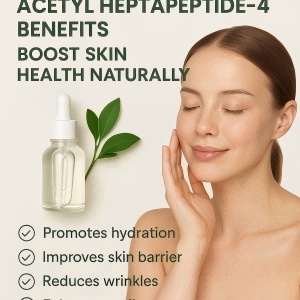Acetyl Heptapeptide-4 Benefits: Boost Skin Health Naturally

Acetyl Heptapeptide-4 is a synthetic peptide gaining attention in skincare for its ability to support skin health by balancing the microbiome and enhancing the skin’s natural defenses. Known as Fensebiome™, this ingredient is used in cosmetic formulations to promote hydration, reduce sensitivity, and improve barrier function. This article explores its benefits, mechanisms, and practical applications in modern skincare routines.
Understanding Acetyl Heptapeptide-4
What Is Acetyl Heptapeptide-4?
Acetyl Heptapeptide-4 is a synthetic peptide with the sequence Ac-Glu-Glu-Met-Gln-Arg-Arg-Ala, designed to mimic natural skin processes. It acts as a probiotic-like ingredient, fostering beneficial bacteria growth while strengthening the skin’s defense against harmful microbes. This peptide is particularly effective in urban environments, where pollution and stress disrupt the skin’s natural microflora, leading to irritation and sensitivity.
How It Differs from Other Peptides
Unlike acetyl hexapeptide-8, which targets muscle contraction to reduce wrinkles, Acetyl Heptapeptide-4 focuses on microbiome balance and skin barrier support. Its unique sequence allows it to enhance dermal cell cohesion, improving skin integrity and hydration. This makes it a versatile ingredient for addressing sensitivity, dryness, and environmental stress rather than solely anti-aging concerns.
Benefits for Skin Health
Strengthening the Skin Barrier
Acetyl Heptapeptide-4 reinforces the skin’s moisture barrier by promoting the growth of beneficial bacteria. Studies show that a balanced microbiome reduces irritation and scaling, particularly for sensitive skin types. By enhancing barrier function, it helps retain moisture, resulting in a smoother, more hydrated complexion.
Reducing Sensitivity and Irritation
Urban lifestyles often expose skin to pollutants that disrupt its natural flora, leading to redness and discomfort. Acetyl Heptapeptide-4 counters this by boosting the skin’s immune response, reducing inflammation, and preventing infections. Its antiallergic properties make it ideal for those with reactive or sensitive skin.
Promoting a Radiant Complexion
By improving hydration and microbial balance, this peptide contributes to a healthier, more radiant appearance. Regular use can minimize dullness and uneven texture, giving the skin a revitalized glow. Its ability to support natural defenses also helps protect against environmental stressors like UV radiation and pollution.
Applications in Skincare Products
Incorporation in Formulations
Acetyl Heptapeptide-4 is found in various products, including moisturizers, serums, and hand sanitizers. Its water-soluble nature allows easy integration into formulations at a typical 10% concentration. Brands like Skin Perfection and others use it in anti-aging and hydrating products to enhance skin texture and resilience.
Best Practices for Use
To maximize benefits, apply products containing Acetyl Heptapeptide-4 twice daily after cleansing. For DIY skincare, mix 10% of the peptide solution with a base like hyaluronic acid or a cream for a customized moisturizer. Always store products in a cool, dry place to maintain peptide stability.
Scientific Insights and Research
Clinical Evidence
Research highlights Acetyl Heptapeptide-4’s role in improving skin microbiota diversity, which is crucial for those living in urban areas. Studies indicate it reduces sensitivity and enhances hydration, with visible results after two months of consistent use. Its safety profile is strong, with low risks of irritation or toxicity, making it suitable for most skin types.
Comparison with Botox Alternatives
While peptides like acetyl hexapeptide-8 mimic Botox by reducing muscle contractions, Acetyl Heptapeptide-4 takes a different approach by focusing on skin health at a microbial level. This makes it a complementary ingredient in anti-aging regimens, offering hydration and protection rather than muscle relaxation.
Practical Tips for Consumers
Choosing the Right Product
Look for products listing Acetyl Heptapeptide-4 or Fensebiome™ in their ingredients. Opt for serums or creams designed for sensitive skin, as these often pair the peptide with hydrating agents like hyaluronic acid or caprylyl glycol for enhanced efficacy.
Integrating into Your Routine
Start with a patch test to ensure compatibility, especially for sensitive skin. Apply after cleansing and before heavier creams to allow penetration. Combine with sunscreen during the day to protect against environmental damage, amplifying the peptide’s benefits.
Future Potential in Skincare
Innovations and Trends
As microbiome-focused skincare grows, Acetyl Heptapeptide-4 is poised to become a staple in formulations targeting urban skin concerns. Its ability to restore microbial balance aligns with the trend toward personalized, science-backed skincare solutions.
Environmental and Lifestyle Considerations
For those in polluted or high-stress environments, this peptide offers a proactive way to maintain skin health. Its role in hand sanitizers also highlights its versatility, restoring moisture and balance after frequent sanitizing, a common need in modern routines.
